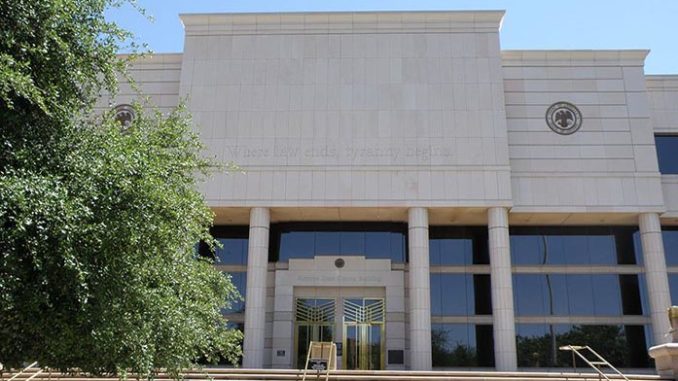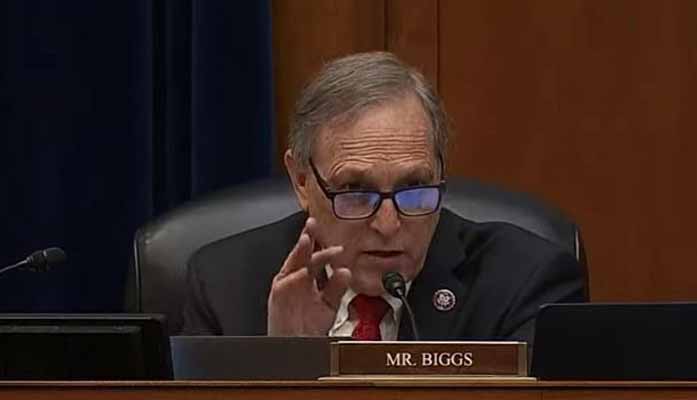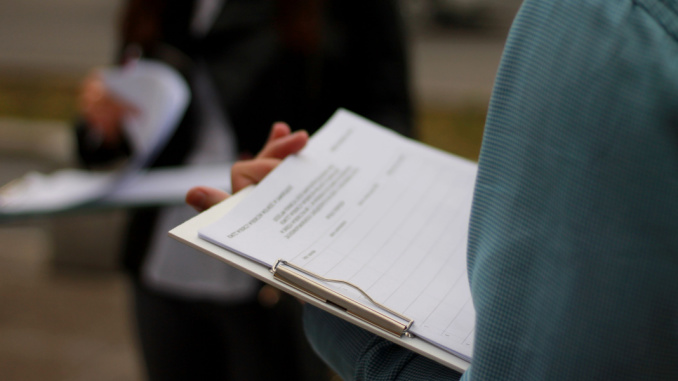
by Matthew Holloway | Sep 24, 2024 | News
By Matthew Holloway |
The Arizona Supreme Court ruled on Friday that nearly 98,000 Maricopa County voters whose citizenship documents got caught up in a coding error will be allowed to vote full ballot in November. Maricopa County Recorder Stephen Richer had moved to have them relegated to voting ‘Fed Only’ in November.
The court received several amicus briefs from voters and organizations across the political spectrum arguing against the move, including the Arizona Republican Party; the League of Women Voters of Arizona; Coconino County Recorder Patty Hansen and Pima County Recorder Gabriella Cazares-Kelly; as well as the Carlos Apache Tribe, Living United for Change in Arizona, League of United Latin American Citizens of Arizona, Mi Familia Vota, and the ACLU of Arizona.
The Republican Party of Arizona (AZGOP) filed an amicus brief Thursday calling upon the court to intervene and prevent the removal of 98,000 voters from the rolls whose registrations were potentially endangered by a controversial clerical error by state officials.
On Tuesday, Arizona’s Democrat Secretary of State Adrian Fontes announced that 97,000 inividuals would be impacted by an error that could prevent them from voting in state-level elections such as state legislative races, initiatives, and referenda. The error affects voters who were issued an Arizona driver’s license prior to October 1, 1996. The figure represents over 2.5% of the state’s total registered electorate. The outlet noted that a technical issue reportedly caused the error which has been resolved, however, the status of those affected is unclear.
In a statement published Thursday the AZGOP announced:
“Today, the Republican Party of Arizona filed an amicus brief in the Arizona Supreme Court supporting the preservation of voter rights in the case involving nearly 100,000 voters whose registration statuses were jeopardized by a state government clerical error.
The AZGOP urges the court to protect voters from sudden disenfranchisement and argues that the requested relief from Petitioner Maricopa County Recorder Stephen Richer violates both state and federal law.
The AZGOP’s amicus brief notes the importance of adhering to the National Voter Registration Act (NVRA), which prohibits systematic voter removals within 90 days of a federal election, and argues that the removal of voters based on this clerical error violates due process and the U.S. Constitution. The AZGOP maintains that any action taken to correct these registration issues should not result in the disenfranchisement of voters who have long participated in Arizona’s elections without issue.”
Gina Swoboda, AZGOP Chair said in a statement:
“Regardless of any outcome on this matter, all of these voters will receive a Federal Only ballot which permits them to vote for President, U.S. Senate, and U.S. Congress. The only question before us is if these voters, who have possessed an Arizona driver’s license since before October 1996, should be denied the right to vote for their representatives in the Arizona legislature, county, school board, and ballot measure contests.
Our brief makes it clear: nearly 100,000 Arizona voters should not be penalized for a mistake made by the government. We will not stand by as voters are disenfranchised, especially so close to an election. The law requires that any changes to voter registration or eligibility must be handled carefully and in accordance with federal and state law. Rushing to disenfranchise voters now would not only be illegal but would severely undermine confidence in our elections.”
In a lengthy post to X, Richer justified his lawsuit saying:
“My office discovered this issue last week, and we have been working with the Governor’s Office, the Secretary’s Office, the MVD, and the Attorney General to fix this moving forward. The number is about 97,000 registrants across the state. All of these people have attested under penalty of law that they are U.S. citizens. And, in all likelihood, they almost all U.S. Citizens. But they have NOT provided documented proof of citizenship. Moving forward (2025 onward), everyone agrees we need DPOC for those voters for them to vote a full ballot. But the Secretary and I have different opinions on what the law requires for the November 5, 2024 General Election. It is my position that these registrants have not satisfied Arizona’s documented proof of citizenship law, and therefore can only vote a ‘FED ONLY’ ballot.”
In the text of the amicus brief, the AZGOP argues that the declaratory judgment requested by Maricopa County Recorder Stephen Richer would stand in violation of both the First and Fourteenth Amendments to the U.S. Constitution, Arizona’s Free and Equal Elections Clause, as well as the National Voter Registration Act. The party’s legal team explained, “It is difficult to imagine state action that would impose a more ‘severe’ burden on the right to vote than abruptly informing an individual who has lived and voted in Arizona for decades—and previously voted in all elections, state and federal—that they must suddenly prove that they are a U.S. citizen in the handful of days remaining before Arizona’s October 7 voter registration deadline if they want to vote in state elections this year.”
Chief Justice Ann Scott Timmer writing for the majority ruled:
“In sum, Richer has not established that the county recorders have statutory authority to remove the Affected Voters from being able to vote in the upcoming 2024 General Election for federal offices and with respect to matters on an Arizona ballot. This is particularly true under the present facts, where a state administrative failure permitted the Affected Voters to be registered without confirming that they provided DPOC when they received their driver’s licenses and where there is so little time remaining before the beginning of the 2024 General Election.”
She continued, “Arizona law provides that ‘[w]hen the county recorder obtains information pursuant to this section and confirms that the person registered is not a United States citizen,’ the county recorder is to initiate a process to cancel a registration that includes sending the person notice that the person’s registration will be canceled in thirty-five days unless the person provides satisfactory evidence of United States citizenship. A.R.S. § 16-165(A)(10). Although challenges are pending to various aspects of the statute, subsection (A)(10) recognizes the right of any voter to notice and an opportunity to contest any determination of a voter’s ineligibility. A county recorder can therefore proceed with respect to individual voters under § 16-165(A)(10) as long as the provision’s due process requirements are followed… Regardless, we are unwilling on these facts to disenfranchise voters en masse from participating in state contests. Doing so is not authorized by state law and would violate principles of due process.”
Matthew Holloway is a senior reporter for AZ Free News. Follow him on X for his latest stories, or email tips to Matthew@azfreenews.com.

by Matthew Holloway | Sep 22, 2024 | News
By Matthew Holloway |
Republican Congressman Andy Biggs carried on the well-worn tradition of symbolic and sometimes whimsical naming conventions for congressional bills last week. On Tuesday, Biggs introduced the Keeping Aid for Municipalities and Localities Accountable Act, abbreviated as the KAMALA Act, in a bid to withhold federal funding from states and municipalities providing housing assistance to illegal immigrants.
The obviously pejorative nature of the bill’s name aside, Biggs and his co-sponsors identified the necessity of the bill by pointing to the “Dream for All program” passed in the California legislature last month. That bill would have allowed illegal immimgrants residing in the state to receive a mortgage down payment handout of up to $150,000 bankrolled by California taxpayers, and given that a 14.5% of the state’s budget comes from federal funding, the American people as a whole.
As Biggs’ office noted in a press release, this California bill was vetoed by Democrat Gov. Gavin Newsom, but not based on an issue with the policy, but rather purely on funding grounds, “not a recognition that the policy creates new incentives for illegal immigration and would drive housing prices further out of reach of middle-class Americans.”
In his veto, Newsom wrote, “This bill seeks to prohibit the disqualification of applicants from one of California Housing Finance Agency’s (CalHFA) home-purchase assistance programs based solely on their immigration status. Given the finite funding available for CalHFA programs, expanding program eligibility must be carefully considered within the broader context of the annual state budget to ensure we manage our resources effectively. For this reason, I am unable to sign this bill.”
In response the KAMALA Act, if adopted, would add new legal language to the Community Development Block Grant (CDBG) program which would prohibit funds from CDBG funded programs to be used to benefit “illegal aliens, parolees, or asylees,” and only benefit American citizens. It would further prohibit the U.S. Department of Housing and Urban Development (HUD) from allowing the same funds to be allocated to “states or localities allowing noncitizens to participate in housing assistance programs.”
Biggs said in a statement, “Americans are outraged at the Biden-Harris Administration’s refusal to put the needs of citizens over the comfort of illegal aliens. Democrats across the country are coddling illegal aliens, providing them with housing assistance while hundreds of thousands of Americans live on the streets. Congress must step in and use the power of the purse to ensure that taxpayers aren’t subsidizing these foolish priorities.”
From the text of the KAMALA Act, the bill states, “Notwithstanding any other provision of law, no amount from a grant under section 106 made in fiscal year 2024 or any succeeding fiscal year may be used to assist persons who are neither a national of the United States nor lawfully admitted for permanent residence under section 101(a)(20) of the Immigration and Nationality Act.”
The act is cosponsored by fellow Arizona Congressmen Paul Gosar (R-AZ), Elijah Crane (R-AZ), as well as Reps. Andy Ogles (R-TN), Matt Rosendale (R-MT), Bob Good (R-VA), Jeff Duncan (R-SC), Andy Harris (R-MD), Lauren Boebert (R-CO), Andrew Clyde (R-GA), and Tim Burchett (R-TN).
Matthew Holloway is a senior reporter for AZ Free News. Follow him on X for his latest stories, or email tips to Matthew@azfreenews.com.

by Matthew Holloway | Sep 21, 2024 | News
By Matthew Holloway |
Earlier this week, a court-appointed Special Master confirmed that nearly 40,000 initiative signatures were duplicates and thus invalid. But on Thursday, Maricopa County Superior Court Judge Frank Moskowitz still ruled that, because Proposition 140 cannot be removed from the ballot, votes for the Ranked Choice Voting and Open Primary initiative will be counted.
The court’s affirmation of the initiative, despite Petition Signature Fraud being proven, sent shockwaves through the Arizona political scene.
Arizona Free Enterprise Club President Scot Mussi released a statement following the ruling, openly accusing Moskowitz of bias in favor of the initiative.
“From the moment he was unanimously rebuked by the AZ Supreme Court for blocking the removal of nearly 40,000 duplicate signatures, Judge Moskowitz has been trying to find a way to place Prop 140 on the ballot, irrespective of whether it had enough signatures to qualify. Today he issued a ruling manufacturing that outcome, deciding that the statutory method for determining the number of valid signatures for ballot initiatives is now unconstitutional. He made this radical determination despite the fact that the statute Moskowitz invalidated is nearly 30 years old and was reviewed and upheld against a constitutional challenge by the AZ Supreme Court in 2022 (Mussi v Hobbs).”
Prior to Moskowitz’s ruling, Arizona Supreme Court Chief Justice Ann Timmer ordered that if the Special Master ruled the signatures invalid, then the Make Elections Fair PAC would be permitted to argue against enjoining the vote count on grounds that court precedent typically required ruling prior to ballot printing, something not required in statute.
This ruling would appear to validate concerns many opponents of the Proposition have voiced, that Secretary of State Adrian Fontes, defending legal council, and Moskowitz himself all sought to deliberately slow-roll the court proceedings beyond the printing date to ‘run out the clock’ and force the vote through.
In the ruling AZFEC deemed “radical” in a post to X, Moskowitz claimed that the confirmation of duplicated, invalid signatures was “moot,” having passed the printing deadline. He curiously cited a statute NOT being present in his justification and leaned purely on case law. He wrote, “Although there is no statutory authority for the proposition that petition challenges must end before ballot printing begins, there is case law that supports such a ‘bright light’ end to such litigation.”
He continued, “Here, the time pressures were such that not every duplicate signature was reviewed and verified by clear and convincing evidence before the August 23, 2024 ballot printing deadline, such that the underlying action is moot as of that deadline.”
In a staggering move, Moskowitz claimed that the court cannot grant injunction against counting the signatures, citing “Perhaps the absence of such express authority in statute,” as expressing the intent of the legislature.
In full he wrote, “That is not a sufficient basis for this Court to grant such a remedy, especially given the injunction allowable under (the law), the statute upon which Plaintiffs initially brought this action, does not include enjoining the canvassing of votes,” Moskowitz wrote. “Perhaps the absence of such express authority in statute is because the Legislature never intended for initiative challenges to go past the ballot printing deadline.”
Mussi wrote in the AZFEC statement that the organization intends to bring the matter to the State Supreme Court once again, “The bottom line is that after the removal of the duplicate signatures, Prop 140 lacks the required number of valid signatures needed to qualify for the ballot. The committee behind the measure was aware of this fact, which is why they obstructed and delayed the review of the duplicate signatures for over a month.
We are confident that after a careful review of the facts, ruling, and trial court record, the AZ Supreme Court will again overturn this outrageous ruling by Judge Moskowitz and enjoin Prop 140 from being tabulated.”
Matthew Holloway is a senior reporter for AZ Free News. Follow him on X for his latest stories, or email tips to Matthew@azfreenews.com.

by Matthew Holloway | Sep 20, 2024 | News
By Matthew Holloway |
The Surprise City Council repealed the ordinance prohibiting residents from criticizing city officials during public meetings in a unanimous vote. The decision followed the now-viral arrest of Rebekah Massie, a local activist, while she addressed the body in August. Massie and the Foundation for Individual Rights and Expression (FIRE) subsequently launched a lawsuit against the city, which according to the group is still ongoing.
In an email from FIRE obtained by AZ Free News, the group confirmed that the lawsuit is moving forward. Attorney Conor Fitzpatrick said in a statement, “The city council’s decision to scrap its unconstitutional rule banning criticism of public officials is the right move — but the damage has already been done. Twenty-eight days ago, police dragged a local mom out of the meeting for criticizing a city attorney’s pay. Twenty-eight days ago, Mayor Skip Hall abused his power to stifle dissent. This decision comes 28 days too late for Rebekah Massie.”
Cameron Arcand, writing for the Arizona Daily Independent, reported that the effort to end the policy was led by Surprise Councilman Jack Hastings. Earlier this week, the councilman posted to X, “On Tuesday, at our next City Council Meeting, I will make a motion and/or vote to remove the rule that prohibits complaints against elected officials and city staff members during the public comment portion of our meetings,” adding “I support the freedom of speech and people should be able to voice their concerns and criticize their government and elected officials.”
“I’m hoping it passes unanimously because it’s the right thing to do. You have to be able to deal with criticism if you’re going to be an elected official,” Hastings told the Center Square via text.
As previously reported by AZ Free News, the lawsuit targeting the city, outgoing Mayor Skip Hall, and Surprise police officer Steven Shernicoff in their individual capacities, was filed September 3rd and is seeking “preliminary and permanent injunction enjoining the City of Surprise from enforcing the Council Criticism Policy during meetings of the City Council of the City of Surprise;” which may be rendered moot by the policy change, as well as a declaratory judgment that the city’s “enforcement of the Council Criticism Policy against Massie on August 20, 2024, violated Massie’s First Amendment rights;” and a declaratory judgment that the policy violated the First and Fourteenth Amendments. Finally, Massie is seeking “compensatory, nominal, and punitive damages,” for her arrest as well as legal fees.
At the time of Massie’s arrest, Mayor-Elect Kevin Sartor who is set to replace Hall condemned the mayor’s actions saying, “As Americans, our right to free speech is fundamental, especially when it comes to holding our government accountable.” He added, “What happened to Rebekah Massie is unacceptable. No citizen should ever be arrested for voicing their concerns, especially in a forum specifically designed for public input.”
“The right to free speech is at the heart of our democracy, and as your next mayor, I will ensure that every citizen’s voice is heard, respected, and protected,” Sartor continued. “While there must be reasonable limits on speech in public forums—such as prohibiting violence, threats, or profanity—this recent incident did not come close to crossing those lines. As mayor, I will ensure that our city is a place where open dialogue is encouraged, not suppressed. We are stronger when every voice is heard.”
Matthew Holloway is a senior reporter for AZ Free News. Follow him on X for his latest stories, or email tips to Matthew@azfreenews.com.

by Matthew Holloway | Sep 19, 2024 | News
By Matthew Holloway |
The narrowly passed repeal of Arizona’s complete ban on abortion became effective on Sep. 14th in a moment that is being widely celebrated by pro-abortion Democrats. Although Democrat Gov. Katie Hobbs signed the bill, H.B. 2677, into law in May, the bill only became effective on Saturday.
Under the current legal framework enacted in 2022, the state of Arizona has an effective ban on abortion after 15 weeks. While the Arizona Court of Appeals had previously ruled that the 2022 15-week measure and the total ban enacted by the territorial legislature in 1864 could be “harmonized,” the Arizona Supreme Court rejected this notion.
The Court wrote in its majority opinion, “Our conclusion that the legislature did not intend to create a privilege secured by law to obtain or perform an abortion obviates the need to harmonize §§ 13-3603 and 36-2322. Harmonization between these laws may be accomplished only by repealing § 13-3603 in contravention of the legislature’s express intent and engaging in untenable statutory interpretation such as excising physicians from the plain meaning of ‘person’ in § 13-3603, defined as ‘a human being’ in A.R.S § 13-105(30). And indeed, despite purporting to harmonize the statutes, the dissent’s treatment of § 13-3603 all but nullifies it. We decline to do so.”
The court ruled that following Dobbs v. Jackson Women’s Health Organization, the ruling that reversed Roe v. Wade, “Arizona has never independently created a statutory right to abortion. We will not ‘amend a statute judicially [nor] read implausible meaning into express statutory language’ given the absence of an abortion right in Arizona jurisprudence. Kyle v. Daniels, 198 Ariz. 304, 306 ¶ 7 (2000). Therefore, because the federal constitutional right to abortion that overrode § 13-3603 no longer exists, the statute is now enforceable, prospectively prohibiting abortion unless necessary to save a woman’s life.”
As reported by the Associated Press, Hobbs in no way intends to stop at repealing the 1864 ban and intends to install the a “right” to abortion in the state. She said in a statement cited by the AP, “I will continue doing everything in my power to protect reproductive freedoms, because I trust women to make the decisions that are best for them, and know politicians do not belong in the doctor’s office.”
In a May post to X, she outright stated, “Any bill attacking the right to safe and legal abortion access will be vetoed without hesitation.”
Indeed the initiative Proposition 139 created by “Arizona for Abortion Access” will appear on the ballot in November to repeal the 2022 15-week abortion ban and create an amendment for a “fundamental right” for abortion up to “fetal viability” allowing a baby’s life to be ended potentially up until birth.
As previously reported by AZ Free News, a legal battle unfolded between the legislature and the initiative organizers over the use of the phrase “unborn human being” in the description of the initiative. The State Supreme Court found in a 5-2 decision that the legislature’s choice to use the phrase “unborn human being” rather than “fetus” met legal standards.
The state legislative council explains in its analysis of the ballot proposal to make abortion a constitutional right:
“Current state law prohibits a physician from performing an abortion if the probable gestational age of the unborn human being is more than 15 weeks, except when a pregnant woman’s medical condition necessitates an immediate abortion to avert the pregnant woman’s death or for which a delay creates a serious risk of substantial and irreversible impairment of a major bodily function.”
Matthew Holloway is a senior reporter for AZ Free News. Follow him on X for his latest stories, or email tips to Matthew@azfreenews.com.





